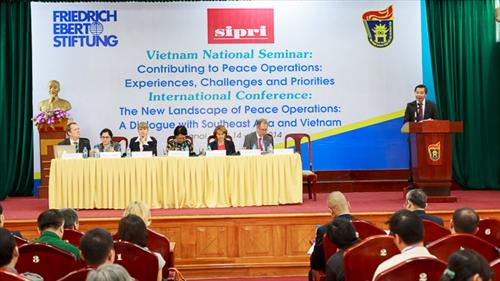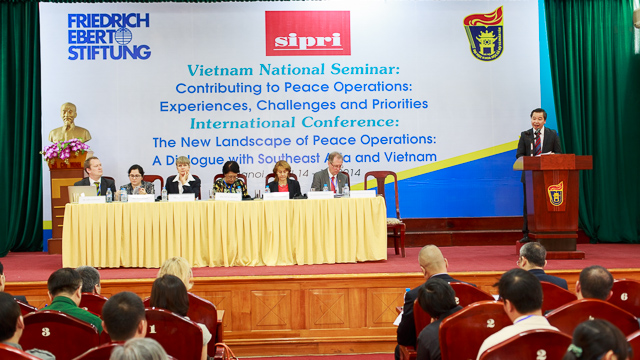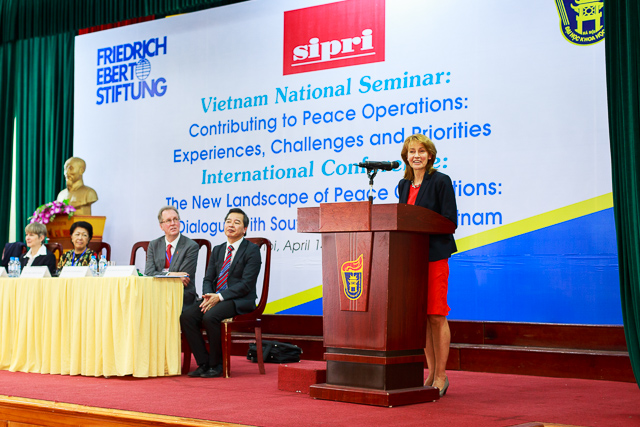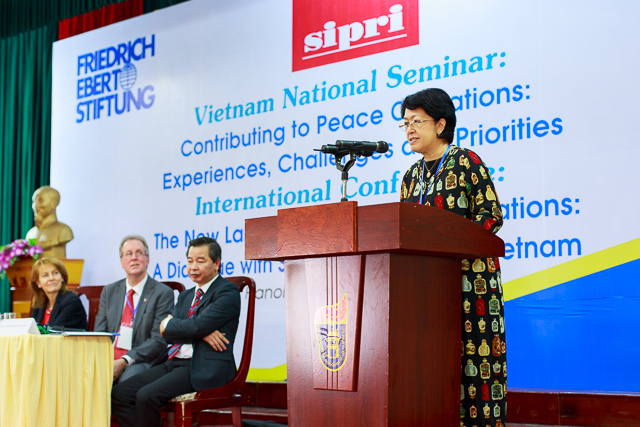

Assoc. Prof. Dr. Pham Quang Minh delivered the opening remarks at the workshop. (Photo: Thanh Long/USSH)
The conference was attended by many scientists, political activists, and diplomats from both domestic and international backgrounds.
On the Vietnamese side, there were Mr. Hoang Chi Trung (Director of the Department of International Organizations, Ministry of Foreign Affairs of Vietnam), Mr. Bui The Giang (Director of the Europe-America Department, Central Committee for External Relations of the Communist Party of Vietnam), Ms. Ton Nu Thi Ninh (Former Vice Chairperson of the Foreign Affairs Committee of the National Assembly of the Socialist Republic of Vietnam, Vice Chairperson of the Peace Committee, Association of Friendship Organizations of Vietnam)... along with delegates from universities and research institutes.
Among the international guests were Ms. Edelgard Bulmahn (Vice President of the Federal Parliament of Germany), Ms. Jutta Frasch (Ambassador of the Federal Republic of Germany to Vietnam), Mr. Natalio C Ecarma III (Deputy Minister of Defence, Philippines), Ms. Eiko Ikegaya (Peacekeeping Operations Department, United Nations)... along with delegates from the University of New South Wales (Australia), the Federal Ministry of Justice of Germany, Heidelberg University (Germany), the German Centre for International Peace Operations, Far Eastern University (Korea), the Institute for International Peace Research (Sweden), the Friedrich Ebert Stiftung (Germany), the Bali Academy for Peace and Democracy (Indonesia)...

Ms. Edelgard Bulmahn (Vice President of the German Federal Parliament) speaks at the conference. (Photo: Thanh Long/USSH)

Ms. Ton Nu Thi Ninh speaks at the workshop. (Photo: Thanh Long/USSH)
In June 2013, at the Shangri-la Defence Dialogue in Singapore, Vietnamese Prime Minister Nguyen Tan Dung officially declared Vietnam's readiness to participate in United Nations peacekeeping operations. This declaration was reaffirmed to world leaders when the Prime Minister attended the general debate of the 68th session of the UN General Assembly in New York on September 27, 2013. With this decision, Vietnam demonstrated its responsibility as a member state, contributing to a field that Vietnam highly values: maintaining international peace and security.
In this context, this international conference aims to provide deeper insights into the activities, perspectives, and experiences of peacekeeping operations from different angles and approaches; to identify new contexts and challenges for peacekeeping operations; new trends in regional and international cooperation in this area; and lessons for Vietnam.
The workshop included the following main sessions:
* “A changing world order – implications for the future of peacekeeping?”It aims to explore and offer insights into future challenges to international peace and regional security, as well as their impact on future peacekeeping operations.
* “Rules and notions – a fragile consensus?”Discuss current rules and concepts regarding conflict, intervention, and peacekeeping operations. What specific perspectives exist regarding these rules and concepts in the region? How do these current perspectives relate to or differ from each other, and why might these differences affect the future of peacekeeping operations? Will new rules and concepts be introduced?
* “Engagement Goals: Political Aspects and Benefits for Participating Parties”:This study assesses how participation in peacekeeping operations aligns with the shared foreign policy objectives of Southeast Asian countries. What are the motivations for participation? Are these motivations driven by political, normative, or economic considerations? Key questions include: what are the primary domestic or foreign policy objectives of governments in the region when participating in peacekeeping operations?; and can we anticipate future shifts in objectives?
* “The New Peacekeeping Context: Peace Operations Version 2.0?”This study examines the prerequisites and requirements for countries and organizations in Southeast Asia to support UN peacekeeping operations. The issues discussed include: What are the challenges facing UN peacekeeping operations? How are they addressed? How can the current commitments of Southeast Asian countries be maintained or strengthened? What contributions can countries make?
* “ASEAN and Peace Activities”:This study explores the current potential and future roles ASEAN can play in managing regional and global conflicts. Key topics include: What role does ASEAN currently play in the Southeast Asian regional security architecture, and how has that role changed in recent years? What roles will ASEAN and the UN play in future peacekeeping operations, both regionally and internationally? How will ASEAN's capacity and structure need to adapt to effectively implement peacekeeping operations?
Author:Thanh Ha
Newer news
Older news